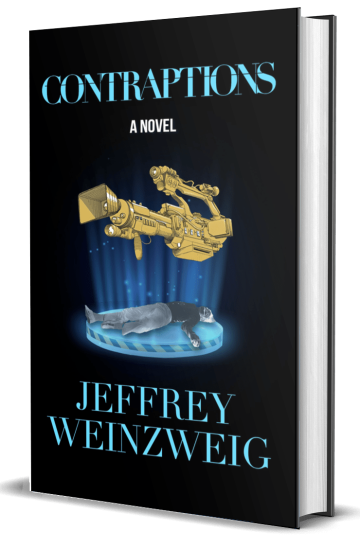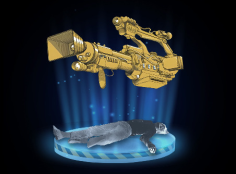At first glance, Contraptions by Jeffrey Weinzweig might seem like a high-octane technomedical thriller—brimming with gadgets, shadowy conspiracies, and futuristic tech. And it certainly delivers on all counts. But what makes the novel linger in the reader’s mind long after the last page isn’t just the tech—it’s the people behind the tech.

Beneath the high-voltage inventions, Weinzweig crafts a surprisingly emotional narrative grounded in friendship, guilt, loss, and human fallibility. It’s this emotional resonance that elevates Contraptions beyond the genre’s expectations and makes it truly unforgettable.
A Story Built on Bonded Minds
At the heart of the novel are Derek Cannon and Ojo Jenachukwu, friends since their MIT days and inventors who run a cutting-edge gadget shop in New York called Contraptions. Their inventions are impressive—from the sarcastic robot Arti to the Thermalyzer, a device that can visualize the thermal past. But it’s the deep, authentic camaraderie between the two men that provides the story’s soul.
They bicker, joke, and problem-solve like brothers. When Ojo is wrongfully arrested for murder, Derek doesn’t hesitate—he mobilizes all their resources and risks everything to prove his friend’s innocence. In a genre often dominated by loner geniuses or cold technicians, Contraptions presents a partnership grounded in trust, loyalty, and shared trauma.
Science Driven by Personal Stakes
The story doesn’t just use technology for spectacle—it uses it to expose emotional vulnerabilities. Derek’s recurring nightmares about his father’s tragic plane crash speak to unresolved grief. That past informs his drive to uncover the truth—not just about Ojo’s situation, but about his own life.
Their inventions are not abstract machines; they’re extensions of their emotional experiences. The Thermalyzer, for example, becomes a device not just of detection, but of reflection—capable of capturing a moment lost in time. It’s technology that brings the past into the present, both physically and emotionally.
A Love Story on the Periphery
Even the supporting characters carry emotional weight. Christine, Derek’s partner, adds another layer of complexity. She’s more than a love interest—she’s an anchor. A journalist with a traumatic past of her own, she understands the costs of emotional suppression and becomes an advocate for both truth and healing.
Her relationship with Derek isn’t forced or formulaic. Instead, it reflects the book’s broader theme: how intimacy and vulnerability can coexist with intellect and innovation.
Human Error, High Stakes
Weinzweig also explores how human error—be it arrogance, oversight, or pride—fuels both crisis and invention. The entire chain of events is triggered by a simple surgical mistake: a needle left inside a patient’s heart. That error sparks a cascade of innovation that leads to the QT7 device—just as it brings personal and institutional reckoning.
The same fallibility drives larger conspiracies. Government secrecy, scientific overreach, and moral compromise all stem from the human tendency to control what cannot—and should not—be controlled.
Contraptions might be packed with futuristic tech and thrilling twists, but it’s the emotional story at its center that makes it matter. Weinzweig reminds us that innovation doesn’t occur in a vacuum—it’s shaped by fear, love, regret, and resilience.
The next time you read a sci-fi thriller, ask yourself: Do the gadgets matter, or do the people behind them? In Contraptions, the answer is both.
